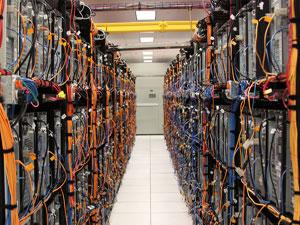Reusing the internet’s power
(Image by The Planet (cc:by-sa))
This story was originally reported by PRI’s The World. For more, listen to the audio above.
The virtual world can have a large carbon footprint in real life. Powering all the computers and equipment needed to make the internet run requires a lot of energy. The Guardian recently estimated that “the internet releases around 300m tonnes of CO2 — as much as all the coal, oil and gas burned in Turkey or Poland in one year, or more than half of those burned in the UK.”
Much of that energy is consumed by data centers, the huge rooms of servers that companies use to store their data. The computers give off a lot of heat, and a massive amount of energy is needed to keep the centers cold. IEEE Spectrum reports that Microsoft’s data center in Quincy, Washington, for example, consumes enough energy to power 40,000 homes.
One data center in Finland is trying to make sure all that energy doesn’t go to waste. The Finnish company Academica built a data center deep inside a bomb shelter, once used for Helsinki City Council meetings during World War II. The computers are cooled by large water pipes, usually piping water from the Baltic Sea.
In partership with a city-owned company called Helsinki Energy, the company realized that they could use the water, heated by the data center, as hot water for people’s homes.
“This is a really simple idea,” Niko Wirgentius of Helsinki Energy told PRI’s The World. “It’s not rocket science.” The two server rooms in the data center can heat an estimated 500 homes for a year, even in Finland’s brutal winters. It will also save the data center nearly $240,000 per year in energy costs, which can be passed on to consumers.
Other companies are taking notice of Helsinki Energy and Academica’s energy-efficient tech ways. The companies recently won a 2010 Green IT award for their data center design from the US-based Uptime Institute. And other green data centers are in the works in Espoo, a city not far from Helsinki. Meanwhile, Helsiki Energy and Academica are working to both scale up their efforts in Finland, and create more green data centers in other cities, too.
PRI’s “The World” is a one-hour, weekday radio news magazine offering a mix of news, features, interviews, and music from around the globe. “The World” is a co-production of the BBC World Service, PRI and WGBH Boston. More “The World.”
We want to hear your feedback so we can keep improving our website, theworld.org. Please fill out this quick survey and let us know your thoughts (your answers will be anonymous). Thanks for your time!
